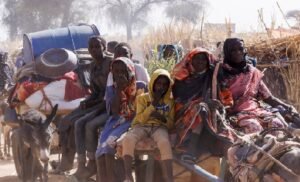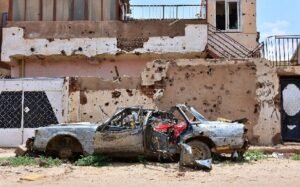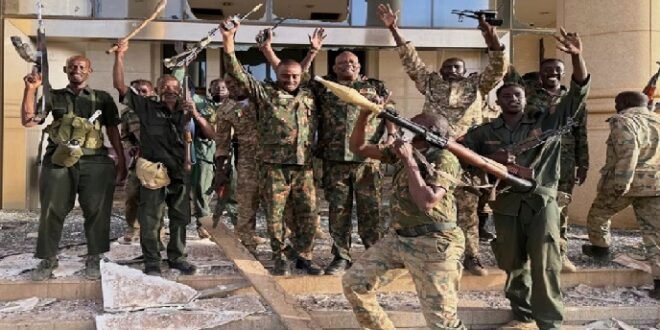31-07-2025
KHARTOUM: On the morning of June 25, the crackling sound of machinegun fire startled Hamisa and her family as they were having breakfast in Sudan’s North Kordofan state.
The paramilitary Rapid Support Forces (RSF) had just stormed her village, Kazkeel, on motorbikes, as they burned huts and farms and fired artillery at women and children fleeing for their lives.
 Hamisa, 60, fled with her seven teenage children, siblings and mother. As they made a run for it, she saw young men from her village picking up guns to confront the RSF.
Hamisa, 60, fled with her seven teenage children, siblings and mother. As they made a run for it, she saw young men from her village picking up guns to confront the RSF.
They were outgunned and outnumbered.
“While we were escaping, we saw the (RSF) kill six young men in front of us,” she told media, solemnly.
“The entire village escaped when the RSF arrived. We left with nothing but the clothes on our backs until we reached the nearest, safest village,” she added.
An epicentre of conflict
Sudan’s regular army, known as the Sudanese Armed Forces (SAF), has fought a bloody civil war against the paramilitary Rapid Support Forces (RSF) since April 2023.
The conflict produced the worst humanitarian crisis in the world by most measures before the RSF’s recent attacks in North Kordofan, a strategic region in southern Sudan.
Over the last several weeks, the RSF has raided villages and scorched families to death. They have also shot and killed pregnant women and children, according to the Emergency Lawyers, a local monitor.
The violence has pushed tens of thousands of people to seek refuge in SAF-controlled el-Obeid, the capital of North Kordofan.
Hamisa and her family are struggling to survive after reaching the city on July 15. Like most displaced people, she is living in an overcrowded hut with barely enough food and clean water.
 In addition, those displaced fear the RSF is trying to reimpose a siege on el-Obeid and then invade the city, a concern shared by analysts and relief workers.
In addition, those displaced fear the RSF is trying to reimpose a siege on el-Obeid and then invade the city, a concern shared by analysts and relief workers.
“People all around us are still traumatised by the RSF. The children with us are very scared. They think the RSF will enter [el-Obeid],” Hamisa told Al Jazeera.
A siege would exacerbate the already catastrophic humanitarian crisis in el-Obeid and eliminate a key SAF logistics hub.
The SAF relies on el-Obeid to carry out air strikes against the RSF in the western region of Darfur, as well as to keep RSF fighters a safe distance away from the capital Khartoum, according to Nathaniel Raymond, who follows conflict dynamics in Sudan as head of the Humanitarian Research Lab at the Yale School of Public Health.
“If SAF loses el-Obeid … they would lose a lot of their ability to project force outside of Khartoum,” he told media.
Back in February, the SAF managed to break the RSF’s chokehold siege over el-Obeid, providing much-needed relief to its units and fighters.
El-Obeid is located some 529 kilometres (329 miles) from North Darfur’s capital el-Fasher, where SAF forces and hundreds of thousands of civilians are currently besieged by the RSF.
Any hope of carrying out a rescue mission to break the siege requires that the SAF maintain control over el-Obeid, explained Raymond.
He added that holding on to the city would also protect Khartoum from being overwhelmed by RSF drone strikes. (Int’l Monitoring Desk)
 Pressmediaofindia
Pressmediaofindia




